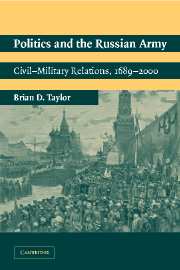Book contents
- Frontmatter
- Contents
- List of Figures
- List of Tables
- Preface
- List of Abbreviations
- Politics and the Russian Army
- Introduction
- 1 Explaining Military Intervention
- 2 Cultural Change in the Imperial Russian Army, 1689–1914
- 3 The Army and the Revolution, 1917
- 4 From Revolution to War, 1917–1941
- 5 From Victory to Stagnation, 1945–1985
- 6 Gorbachev, Perestroika, and the Collapse of the Soviet Union, 1985–1991
- 7 Yeltsin and the New Russia, 1992–2000
- 8 Organizational Culture and the Future of Russian Civil–Military Relations
- Index
6 - Gorbachev, Perestroika, and the Collapse of the Soviet Union, 1985–1991
Published online by Cambridge University Press: 16 January 2010
- Frontmatter
- Contents
- List of Figures
- List of Tables
- Preface
- List of Abbreviations
- Politics and the Russian Army
- Introduction
- 1 Explaining Military Intervention
- 2 Cultural Change in the Imperial Russian Army, 1689–1914
- 3 The Army and the Revolution, 1917
- 4 From Revolution to War, 1917–1941
- 5 From Victory to Stagnation, 1945–1985
- 6 Gorbachev, Perestroika, and the Collapse of the Soviet Union, 1985–1991
- 7 Yeltsin and the New Russia, 1992–2000
- 8 Organizational Culture and the Future of Russian Civil–Military Relations
- Index
Summary
The sudden and unexpected disintegration of the powerful Soviet empire, even in retrospect, is not easy to understand and explain. The role of the armed forces in this collapse is perhaps the most baffling element. The prominent Sovietologist Jerry Hough wrote in 1992 that he did not think the Soviet Union would fall apart because he assumed that countries do not just collapse unless their army has been destroyed or gravely weakened in war. “It was inconceivable,” Hough maintains, that the military would let the Soviet Union collapse “without even being seriously bloodied. Simply inconceivable. I still don't believe it.”
The Soviet armed forces were involved in two sovereign power issues at the end of Mikhail Gorbachev's rule: the failed August 1991 hard-liner coup and the collapse of the Soviet Union in December 1991 (see Table 6.1). Several leading officers, including the Minister of Defense, were involved in the August 1991 coup, but key subordinates refused to follow orders and the putsch rapidly collapsed. The army was thrust into the arbiter role in December 1991, but chose not to intervene to prevent the collapse of the Soviet Union.
The effects of Gorbachev's perestroika policies greatly increased both the opportunity and motives for military intervention. The substantial weakening of the political capacity of the Soviet state played a key role in opening up an opportunity for military involvement in sovereign power issues. Under these circumstances the organizational structural barriers set up to inhibit coups, specifically counterbalancing and penetration, were not effective mechanisms to prevent coups.
- Type
- Chapter
- Information
- Politics and the Russian ArmyCivil-Military Relations, 1689–2000, pp. 206 - 258Publisher: Cambridge University PressPrint publication year: 2003



